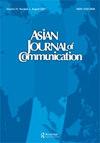绿色广告:考察诉求安排对印尼年轻消费者绿色态度及购买意愿的影响
IF 1.5
2区 文学
Q2 COMMUNICATION
引用次数: 4
摘要
绿色广告的研究有不同的结果,使用单一和混合的呼吁消费者的绿色态度和行为意图。然而,几乎没有调查对上诉进行排序或排序或重复上诉的影响。利用前景理论、绿色广告和计划行为理论,这个实验有160名印度尼西亚大学生参与者,发现绿色态度更容易通过呼吁顺序而不是呼吁重复来形成。而诉求安排类型对感知难度较高和较低绿色产品的购买意愿影响不显著。感知难度的调节作用仅在感知难度较低的绿色产品上显著。此外,绿色态度在诉求安排对绿色产品购买意愿的影响中起中介作用。本文还讨论了研究结果的理论和实践意义。本文章由计算机程序翻译,如有差异,请以英文原文为准。
Green advertising: examining the effects of appeal arrangement on young Indonesian consumers’ Green attitudes and buying intention
ABSTRACT Studies of green advertising have had mixed findings from using single and hybrid appeals to consumers’ green attitudes and behavioral intentions. However, the effects of ordering or sequencing the appeals or repeating them have scarcely been investigated. Drawing upon prospect theory, green advertising, and the theory of planned behavior, this experiment, with 160 Indonesian university student participants, found that green attitudes were better formed by appeal order than appeal repetition. In contrast, the types of appeal arrangement generated insignificant differences in buying intention between green products with lower and higher perceived difficulty. The moderating effects of perceived difficulty were significant only on green products with lower perceived difficulty. Furthermore, green attitudes mediated the impacts of appeal arrangement on the intention to buy green products with both lower and higher perceived difficulty. The findings’ theoretical and practical implications also are discussed.
求助全文
通过发布文献求助,成功后即可免费获取论文全文。
去求助
来源期刊

Asian Journal of Communication
COMMUNICATION-
CiteScore
3.70
自引率
0.00%
发文量
38
期刊介绍:
Launched in 1990, Asian Journal of Communication (AJC) is a refereed international publication that provides a venue for high-quality communication scholarship with an Asian focus and perspectives from the region. We aim to highlight research on the systems and processes of communication in the Asia-Pacific region and among Asian communities around the world to a wide international audience. It publishes articles that report empirical studies, develop communication theory, and enhance research methodology. AJC is accepted by and listed in the Social Science Citation Index (SSCI) published by Clarivate Analytics. The journal is housed editorially at the Wee Kim Wee School of Communication and Information at Nanyang Technological University in Singapore, jointly with the Asian Media Information and Communication Centre (AMIC).
 求助内容:
求助内容: 应助结果提醒方式:
应助结果提醒方式:


